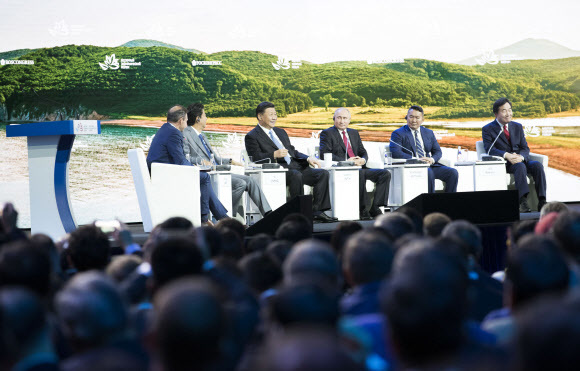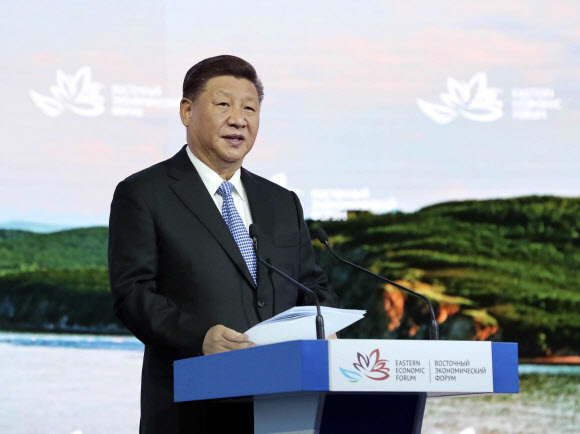 |
|
Japanese Prime Minister Shinzo Abe (second from left), Chinese President Xi Jinping, and Russian President Vladimir Putin at the Eastern Economic Forum in Vladivostok, Russia, on Sept. 12. (Tass)
|
Xi Jinping expresses willingness to accept trilateral peace framework
The leaders of China, Russia, and Japan shared their thoughts on the current Korean Peninsula situation at the Eastern Economic Forum, which came to a close in Vladivostok on Sept. 13. Amid the deadlock in North Korea-US negotiations on denuclearization, China opted for a slight concession, while Russia called for resumption of the Six-Party Talks. Japan reiterated its focus on keeping sanctions in place and resolving the issue of Japanese nationals abducted to North Korea. Speaking at the forum’s general session in Vladivostok on Sept. 12, Chinese President Xi Jinping signaled that he would be willing to tentatively accept a trilateral framework focusing on South and North Korea and the US in building a peace regime on the Korean Peninsula. Beijing no longer demanding to be direct party in end-of-war declaration “The countries currently involved are North and South Korea and the US. They must continue [their efforts], and we should cooperate with them,” he said. Taken literally, Xi’s remarks suggest Beijing plans to cooperate as an “interested party” rather than a central presence in the declaration of an end to the Korean War and subsequent transition to a peace regime. As recently as one month ago, Beijing was stressing its own position as a direct party that could not be left out of the process. National People’s Congress foreign affairs committee chairman Zhang Yesui told a visiting delegation of South Korean National Assembly members on Aug. 16 that China “must be a part of the end-of-war declaration process.” In mid-July, Central Foreign Affairs Commission deputy director and politburo member Yang Jiechi – seen as the “control tower” for Chinese diplomacy – paid a top-secret visit to South Korea to discuss the issue with Blue House National Security Office director Chung Eui-yong. But Xi now appears to be backing off after US President Donald Trump halted dialogue with North Korea, naming Beijing as a “stumbling block” to denuclearization talks. His message about China remaining in a “cooperative” role on Sept. 12 came after a previous decision to send National People’s Congress standing committee chairman Li Zhanshu – the third-ranking figure in the Chinese Communist Party hierarchy – in his stead to attend a Sept. 9 event celebrating the 70th anniversary of North Korea’s government. “If things are in a state where they’re talking about North Korea-China relations involving ‘close cooperation and collaboration within a single general staff’ [as North Korean leader Kim Jong-un said during his third China visit on June 19], China may not feel the need to take part in an end-of-war declaration [for the time being],” said Sungkyunkwan University Sungkyun Institute of China Studies director Lee Hee-ok on the shift in Beijing’s position. “It wouldn’t be a problem if they got on board with a peace agreement and peace regime once the hurdles have been cleared with the denuclearization talks,” Lee suggested.
 |
|
Chinese President Xi Jinping speaking at the Eastern Economic Forum in Vladivostok, Russia, on Sept. 12.
|







